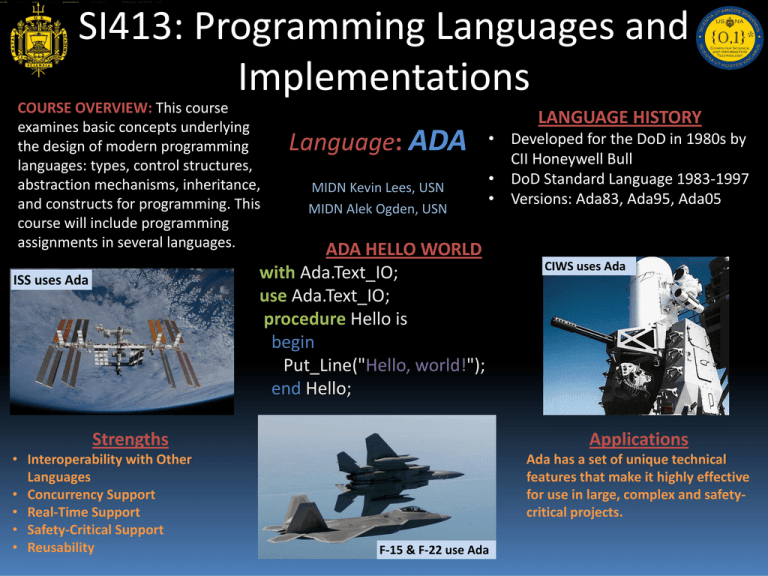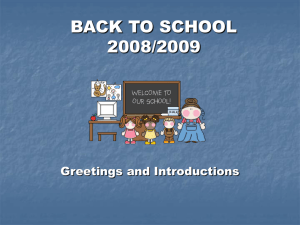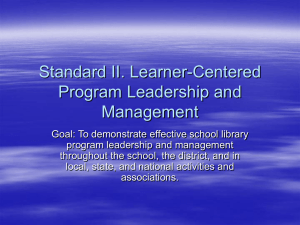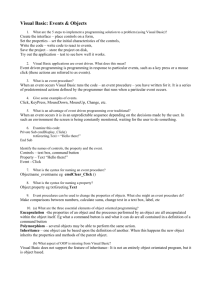SI413: Programming Languages and Implementations ADA
advertisement

with Ada.Text_IO; use Ada.Text_IO; procedure Hello is begin Put_Line("Hello, world!"); end Hello;
SI413: Programming Languages and
Implementations
COURSE OVERVIEW: This course
examines basic concepts underlying
the design of modern programming
languages: types, control structures,
abstraction mechanisms, inheritance,
and constructs for programming. This
course will include programming
assignments in several languages.
Language: ADA
MIDN Kevin Lees, USN
MIDN Alek Ogden, USN
LANGUAGE HISTORY
•
Developed for the DoD in 1980s by
CII Honeywell Bull
• DoD Standard Language 1983-1997
• Versions: Ada83, Ada95, Ada05
ADA HELLO WORLD
with Ada.Text_IO;
use Ada.Text_IO;
procedure Hello is
begin
Put_Line("Hello, world!");
end Hello;
ISS uses Ada
Strengths
• Interoperability with Other
Languages
• Concurrency Support
• Real-Time Support
• Safety-Critical Support
• Reusability
CIWS uses Ada
Applications
Ada has a set of unique technical
features that make it highly effective
for use in large, complex and safetycritical projects.
F-15 & F-22 use Ada
SI413: Programming Languages and Implementation
Features
Overview
• Written by Brian Fox for the GNU Project in 1989
• BASH stands for Bourne Again Shell
• BASH is a shell scripting language, perfect for writing
command line programs
• Huge amount of online support
• Used to easily automate complex series of commands
for easy reuse
Cool Stuff
Code Examples
#!/bin/bash
echo Hello World
diff <(find dir1) <(find dir2)
if [ $file1 -nt $file2 ]
• No explicit types
• Supports arrays: no size declaration required
• Redirect stdin and stdout to files
• Flexible parameter passing with functions
• Extensive string manipulation
•tr command
• Tight integration with operating system
• Commands executed on the command line can be
executed in the shell script
• Variables global unless declared otherwise
• Read and write to sockets
• Process substitution
• Multifunctional test command
• Debugging: #!/bin/bash –x
• Can execute most Bourne shell scripts without
modification
• Doesn’t support floating point math
• Only supports 1-D arrays
Hello world script
Find difference between
the contents of 2
directories
Checks if file1 has been
modified more recently than
file2
Gotchas
• Use of whitespace in variable assignments
• Mixing up –eq and =
• Assuming uninitialized variables are zero
SI 413: Programming Languages and Implementation
What brain**ck has been used for:
Self interpreters!
>>>+[[-]>>[-]++>+>+++++++[<++++>>++<]++>>+>+>+++++[>++>++++++<<-]+>>>,<++[[>[ >>]<[>>]<<-]<[<]<+>>[>]>[<+>-[[<+>-]>]<[[[-]<]++<[<+++++++++>[<->-]>>]>>]]<<
]<]<[[<]>[[>]>>[>>]+[<<]<[<]<+>>-]>[>]+[>>]<<<<[[<<]<[<]+<<[+>+<<-[>-->+<<-[> +<[>>+<<]]]>[<+>-]<]++>>->[>]>>[>>]]<<[>>+<[[<]<]>[[<<]<[<]+[-<+>>[<<+>++>- [<->[<<+>>-]]]<[>+<]>]>[>]>]>[>>]>>]<<[>>+>>+>>]<<[>>>>>>>>]<<[>.>>>>>>>]<<[ >>>>>>]<<[>,>>>]<<[>+>]<<[+<<]<]
Original Distribution
Creator:
Urban Muller
[Daniel B Cristofani (cristofdathevanetdotcom)
http://www.hevanet.com/cristofd/brainfuck/]
Hello world!
>+++++++++[<++++++++>-]<.>+++++++[<++++>]<+.+++++++..+++.>>>++++++++[<++++>-]
<.>>>++++++++++[<+++++++++>-]<---.<<<<.+++.-----.--------.>>+.
This course examines basic concepts underlying the design of modern
programming languages: types, control structures, abstraction mechanisms,
inheritance, and constructs for programming. This course will include
programming assignments in several languages
Other uses:
Created by:
Brandon Tinkham
William McCrone
SI 413: Programming Languages and Implementation
SI 413: Programming Languages and
Implementation
The Course
Fortran
This course examines basic concepts
underlying the design of modern programming
languages: types, control structures,
abstraction mechanisms, inheritance, and
constructs for programming. This course will
include programming assignments in several
languages.
You will learn the
skills necessary to
quickly learn and
begin programming in
any new language
you may encounter.
During the semester you will become familiar
with how a programming language works
and how you can write and modify your own
language.
Designed by John Backus
and his IBM team in 1957. It
was the first high level assembly
language and is still used today,
mostly in the scientific
community.
Fortran is still used today,
primarily by scientists,
especially within the
astrophysics community.
This is because Fortran is
good at handling math and
numbers.
Fortran has some downsides that keep it from being mainstream.
Input and output are incredibly difficult to format if you want
anything other than simple read/write. Also, two dimensional
arrays or stored differently than in C++, so you have to be
mindful that while they have similar syntax, array calls mean
entirely different things in Fortran.
This course examines basic concepts underlying the design of modern programming languages:
types, control structures, abstraction mechanisms, inheritance, and constructs for programming.
This course will include programming assignments in several languages.
Some languages used
Imperative: Ada, C
Object-Oriented: Java, C++
Functional: Haskell, Lisp
Scripting: Bash, Perl
Logic-based: Prolog
Imperative programming is a list of step-by-step
instructions for the program to follow in order to
execute. The programmer tells the computer exactly
how to solve the problem. In functional programming,
the programmer defines functions that are very similar to
mathematical functions , defining what is computed, not
how. For example, adding 1 to each element of a list or
array is very different in a functional vs imperative
language.
IMPERATIVE (C)
int x = 0;
while( x < arraySize ){
array[x] = array[x] + 1;
x = x + 1;
}
FUNCTIONAL (Haskell)
map (1+)[LIST]
Ethan Panal and Taylor Cooper
SI 413: Programming Languages
and Implementation
This course examines basic concepts underlying the
design of modern programming languages: types, control
structures, abstraction mechanisms, inheritance, and
constructs for programming. This course will include
programming assignments in several languages.
Syntax
OCAML – A functional paradigm programming language that combines
object oriented and imperative techniques with static typing to ensure strict
type safety. Major Uses- MLDonkey p2p client, Airbus A340 Control Software
Did you know: OCAML is an abbreviation for Objective Categorical Abstract
Machine Language?
Semantics
Smalltalk
SI413 – Programming Languages
MIDN La’Shaundra Collins, USN
MIDN Brian Real, USN
Features
Overview
- Small and uniform language
- Large library of reusable classes
- Advanced development tools
Smalltalk is a programming language based on
message passing, dynamic strong typing,
reflection, and object orientation.
Smalltalk vs. C++ vs. Java
Messages and Methods
Message: which action to perform
aWorkstation accept: aPacket
aMonster eat: aCookie
Method: how to carry out the action
accept: aPacket
(aPacket isAddressedTo: self)
ifTrue:[
Transcript show:
'A packet is accepted by the Workstation ',
self name asString ]
ifFalse: [super accept: aPacket]
Smalltalk
C++
Java
Pure
Hybrid
Hybrid
Garbage
Collection
Automatic
Manual
Automatic
Inheritance
Single
Multiple
Single
Dynamic
Static
Static
Object Model
Types
Reflection
Concurrency
Modules
Fully reflective Introspection
Semaphores,
Monitors
Categories,
Namespaces
Introspection
Some libraries
Monitors
Namespaces
Packages




